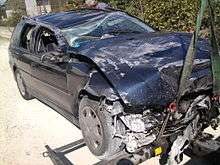Bus plunge
Bus plunge stories are a nickname for a journalistic practice of reporting bus mishaps in short articles that describe the vehicle as "plunging" from a bridge or hillside road.[1][2] The phenomenon has been noted in the New York Times, which once published as many as 14 "bus plunge" stories per year in its foreign news section.[3]
The stories exist not only because of their perceived newsworthiness but because they could be reduced to a few lines and used to fill gaps in the page layout. Further, the words "bus" and "plunge" are short, and can be used in one-column headlines within the narrow, eight-column format that was prevalent in newspapers through the first half of the 20th century.
The adoption of computerized layout tools has reduced the need for such filler stories, but news wires continue to carry them.[3] It was spoofed in an episode of Mr. Belvedere where an immigrant said he felt the need to move away from India after a "bus plunge" (in a Hindi accent) killed his friends and family.
See also
Notes
- ↑ "Miracle escape in bus plunge". Thisislocallondon.co.uk. 2001-01-03. Retrieved 2014-01-02.
- ↑ "Collection of Bus Plunge articles". Users.lmi.net. Retrieved 2014-01-02.
- 1 2 Shafer, Jack (13 November 2006). "The rise and fall of the "bus plunge" story". Slate Magazine. Slate.com. Retrieved 13 April 2013.
